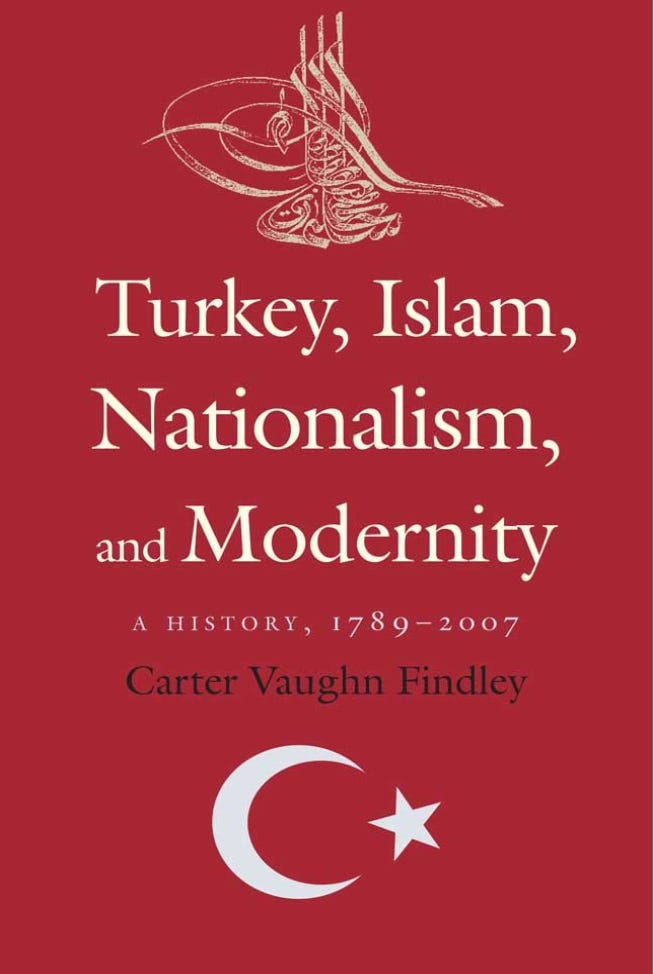A while back, a reader messaged me to ask if I could recommend any books on Ottoman history. I was happy to oblige, and, in addition to responding to them in private, I also began sharing books that I believed were essential for understanding the history of the Ottoman Empire on my Notes feed.
Since many of you either don’t use Notes or are not very active on it, this week, I thought I would bring those recommendations together in a post. Below, I’ll share with you five books that will give you a solid foundation if you want to learn about Ottoman history. They are all written by experts in the field and cover both the early and later periods.
I’ll be posting links in case you want to check the works out in more detail. I don’t, however, have any affiliations with any of the websites that I link to.
Colin Imber, The Ottoman Empire, 1300-1650: The Structure of Power, 3rd ed., Bloomsbury Publishing, 2019.
Colin Imber’s book is a very good introductory work on the early history of the Ottoman Empire. It was one of the first books that my advisor had me read when I started my PhD.
In addition to providing a concise narrative account of the period between 1300 and 1650, Imber also writes about the structural foundations of the empire during this time. His chapters on the Ottoman palace, dynasty, and military provide a solid understanding of these institutions. The book also has a wide geographical scope, analyzing the Ottoman presence in the Balkans and the Arab provinces.
It is a standard text that is usually assigned in undergraduate classes, and I recommend it to anyone interested in the topic.
Douglas Howard, A History of the Ottoman Empire, Cambridge University Press, 2017.
If you want an account of Ottoman history as a whole, this book is for you.
Howard covers the Empire's entire history, from its beginnings in the late 13th century to its demise in the early 20th century. Unlike the other works on this list, this book has more of a narrative bend rather than an analytical one. It is still a good introductory work, though, so if you’re interested, definitely check it out.
Halil Inalcik (ed.), An Economic and Social History of the Ottoman Empire Vol. I: 1300-1600, Cambridge University Press, 1994.
This one is a classic. Halil Inalcık was one of the greatest Ottoman historians, and this work is a must-read for anyone who wants to dive deeper into the early history of the Ottoman Empire.
The book actually consists of two volumes, but Vol. I is the more important of the two, where Inalcik explains the economic foundations of the Empire, which, he believed, was one of the key reasons for the Ottomans’ early success.
Inalcik’s text is a staple of the grad school curriculum in Ottoman studies, and I continue to use it as a reference work. It is definitely not an easy read, but it is worth taking a look at if you want a solid understanding of the administrative structure of the early Ottoman Empire.
Şükrü Hanioğlu, A Brief History of the Late Ottoman Empire, Princeton University Press, 2008.
Let’s continue with the later period. This work by Hanioglu is a good starting point, especially if you are not very familiar with the late Ottoman history.
It’s relatively short and gives a narrative history spanning from the late 18th century to the Empire’s demise at the beginning of the 20th century. Hanioglu also analyzes the changes that the Ottoman Empire went through during this time, exploring what worked and what did not.
If you want to understand how the modern Middle East came into existence, you have to understand late Ottoman history, and Hanioglu’s book is an excellent introduction to the topic.
Carter V. Findley, Turkey, Islam, Nationalism, and Modernity: A History, 1789-2007, Yale University Press, 2011.
Modeled on Bernard Lewis’s classic The Emergence of Modern Turkey, Carter Findley’s book is not only a very detailed study of late Ottoman history but also gives a comprehensive view of the birth of modern Turkey and beyond.
Findley writes in detail about the political, economic, and social changes the Ottoman Empire went through from the late 18th century onwards and analyzes how these changes continued to shape modern Turkey after its establishment in 1923. A key aspect of Findley’s book is his focus on the (at times cooperative and at times contradictory) relationship between progressive and conservative approaches to modernity, which he presents as a leitmotif that runs through the history of the late Ottoman Empire and modern Turkey.
Findley was my PhD advisor, so I might be biased in saying this, but this book is a really good study of the late Ottoman Empire and modern Turkey (especially the early period). Highly recommended!
So there you have it! Five books that will give you a solid foundation on Ottoman history. Don’t hesitate to share it with anyone who you think might be interested in the topic. And, if you want more detailed articles on the fascinating world of the Ottoman Empire, please make sure you subscribe to my newsletter.
Until next time!










These kind of reading lists coming from professional teachers for the lay reader are very welcome. Perhaps the author of the article with his genial spirit and generosity ought to consider a scripted narrative podcast called History of the Ottomans without any gaps organised by the chronology of rulers but allowing for deep dives in matters social, economic, cultural, where merited…
Hi Doga
Which one is best for background on the Phanariots ?
Thanks for the reading list - looks interesting
Joanna